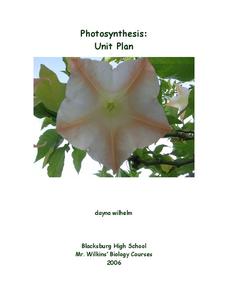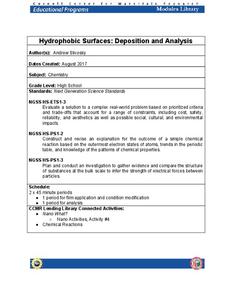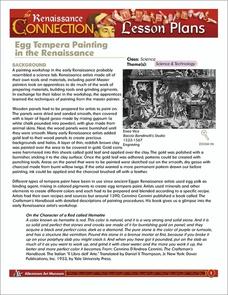Curated OER
The Purpose of Each Part of a Plant
Beginning botanists can sketch the parts of a plant in individual boxes, or better yet, they can tape or glue actual plant parts in them. Beside each box are a few sentences with selected words left out. From the word bank at the bottom...
Towson University
Mystery of the Crooked Cell
Can your class solve the Mystery of the Crooked Cell? Junior geneticists collaborate to learn about sickle cell anemia in a fascinating lesson plan. The included materials help them to examine the genetic factors behind the disease...
Curated OER
Riding on a Pendulum
A comprehensive resource gets fourth grade physical scientists making observations about the period of a pendulum and then applying knowledge to a playground swing. Through seven different stations, they will record observations and...
Science 4 Inquiry
Bubbles and Colors and Smells...Oh My!
A demonstration of elephant toothpaste hooks pupils' interest as they complete multiple experiments with colors, smells, bubbles, and more. By the end, they understand the differences between physical and chemical changes in the world...
SRI International
Nanofiltration
How can everyone in the world have access to clean drinking water? Throughout the lesson plan, learners read about and listen to how water is filtered, what the filtration process removes, and the best ways to filter. They explore the...
Baylor College
What Makes Water Special?
Get close up and personal with a drop of water to discover how the polarity of its molecules affect its behavior. Elementary hydrologists split and combine water droplets, and also compare them to drops of oil. Much neater than placing a...
Baylor College
Can Nutrients in Water Cause Harm?
Ecology candidates culture pond water organisms over a few days time, then they experiment to find out how increasing nutrients affects the population. As part of a unit on water, this exploration gives your class an understanding of how...
Baylor College
What Is the Water Cycle?
Small groups place sand and ice in a covered box, place the box in the sunlight, then observe as evaporation, condensation, and precipitation occur. These models serve as miniature water cycles and demonstrations of the three phases of...
Baylor College
What Dissolves in Water?
One of water's claims to fame is as the universal solvent. Young physical scientists experiment to discover which materials dissolve in this special compound. You could never be more prepared for teaching this lesson than by using this...
Baylor College
Finding the Carbon in Sugar
In session one, demonstrate for your class how a flame eventually goes out when enclosed in a jar in order to teach that oxygen is required for combustion. In session two, class members then burn sugar in a spoon to observe how it...
Discovery Education
Sonar & Echolocation
A well-designed, comprehensive, and attractive slide show supports direct instruction on how sonar and echolocation work. Contained within the slides are links to interactive websites and instructions for using apps on a mobile device to...
Curated OER
Photosynthesis
We all know photosynthesis happens, but why should we care? Here is a unit that covers everything young scholars need to know about photosynthesis. Hands-on activities, assessments, and lectures guide pupils though the physiology of a...
Science 4 Inquiry
States and Phases of Matter
Plasma is the most common phase of matter in our universe. Scholars explore the change of energy as molecules change phases of matter. They rotate through stations, graphing the changes in energy level.
Micron Technology Foundation
Electricity
Conduct four electrifying electricity experiments that challenge young scientists to explore positive and negative charges and magnetic fields without the shock.
Curated OER
Testing for Life’s Molecules
Want to hear a joke about sodium? Na. Young scientists test various materials to identify if they include protein, starch, and glucose by using the Biuret test, iodine starch test, and Benedict's test respectively. After practicing with...
Cornell University
Hydrophobic Surfaces—Deposition and Analysis
Couches, carpets, and even computer keyboards now advertise they are spill-resistant, but what does that mean? Scholars use physical and chemical methods to coat surfaces with thin films to test their hydrophobic properties. Then they...
Baylor College
Why Circulate?
Lub-dub, lub-dub. Why does the heart beat? Why does blood circulate throughout the body? Life scientists find out how important circulation is for dissolving and dispersing materials by timing how long it takes for food coloring spread...
Baylor College
Heart Rate and Exercise
What is the relationship among the heart, circulation, and exercise? Your class members will explore first-hand how different physical exercises affect an individual's heart rate. They will begin by learning how to measure their own...
NOAA
Stressed Out!
Are our oceans really suffering due to the choices humans make? The sixth and final installment in the volume of activities challenges research groups to tackle one of six major topics that impact ocean health. After getting to the...
American Chemical Society
Preparation and Combustion of Biodiesel
The United States is the world's largest producer of biofuel. During an in-class investigation, young scientists produce their own biodiesel. They burn a sample of it to determine the heat of combustion. Then they discuss the results...
Curated OER
Nature of Science and Ecology
Young scholars identify the different biotic and abiotic components of an ecosystem. In this ecology lesson, students perform a case study on current environmental problems. They write a position statement about their chosen topic and...
Curated OER
Taste Test
Third graders, in groups, complete a science lab in which they perform a blind taste test on eight different foods--some sweet, sour, salty, and bitter. They determine which parts of the tongue "taste" which kinds of foods. they record...
Curated OER
Egg Tempera Painting In The Renaissance
Students explore the development of paint and paintings during the Renaissance. In a science lab, they reproduce the properties of egg in tempera paint and compare and contrast egg tempera paintings to oil paintings. Through...
Curated OER
Scientific Equipment Word Search
In this scientific equipment instructional activity, learners locate words related to science lab materials. A list of 21 words is provided for identification. An answer sheet is provided.
Other popular searches
- Science Lab Safety Rules
- Science Lab Safety
- Environment Science Labs
- Physical Science Lab Safety
- Forensic Science Lab
- Teaching Science Lab Safety
- Science Lab Equipment
- Science Lab Report
- Simple Science Lab Report
- Science Lab Safety Symbols
- Physical Science Labs
- Science Lab Report Templates

























